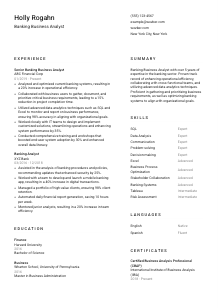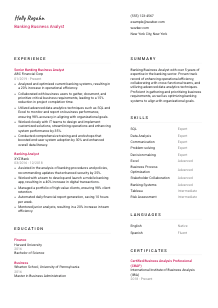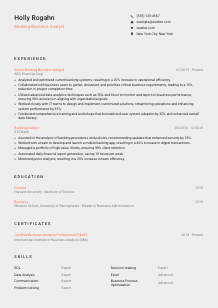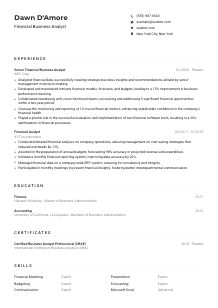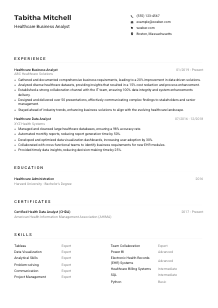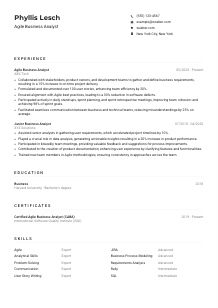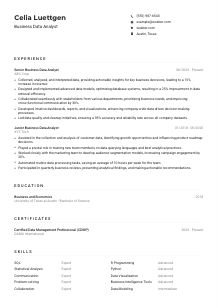Banking Business Analyst Resume Example
Unraveling financial flows, but your resume lacks interest yield? Delve into this Banking Business Analyst resume example, tailored with Wozber free resume builder. See how to channel your analytical acumen and industry insights to meet the job's requirements, depositing your career onto a growth trajectory as impressive as the bank's assets!
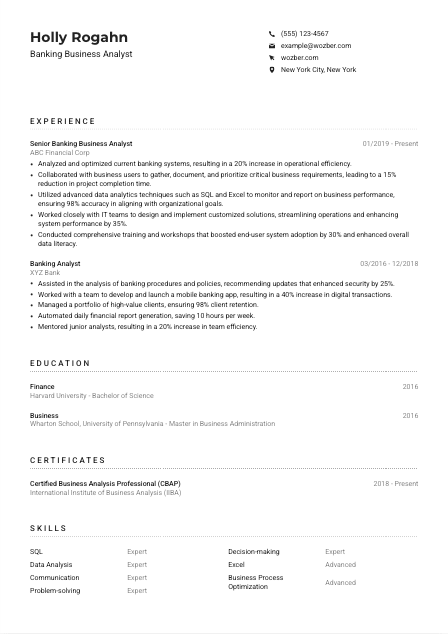
How to write a Banking Business Analyst resume?
Hey there, future Banking Business Analyst guru! If you're aiming to break into the world of Banking Business Analysis, let's get one thing straight: your resume needs to be as analytical and detail-oriented as you are. Using Wozber's free resume builder, we're diving deep into how you can craft a resume that not only meets the mark but exceeds expectations. Let's transform your resume into a reflection of your unparalleled skills and experiences, perfectly tailored for the banking sector.
Personal Details
In the competitive arena of Banking Business Analysis, your personal details section isn't just filler—it's your first handshake with a potential employer. Let's ensure it speaks volumes in just a glance.
1. Be the Brand
Think of your name as the logo to your personal brand—make it stand out. Opt for a clean, professional font that stands slightly proud of the rest of your text. This isn't just typography; it's the first impression.
2. Job Title Precision
Including the exact job title from the description, in this case, 'Banking Business Analyst,' instantly aligns your resume with the position. It's a strategic move that subtly aligns your aspirations with the employer's expectations.
3. Critical Contact Info
Your phone number and email should be foolproof and professional. Verify your contact details twice to ensure they're typo-free. Remember, a professional email format (firstname.lastname@email.com) speaks volumes about your attention to detail.
4. Geographic Synergy
"Must be located in New York City, New York" isn't just a desire—it's a deal-breaker. By confirming your NYC location up front, you reassure the employer that you're ready and available, circumventing any relocation delays.
5. The Digital You
In today's digitally-driven world, including a LinkedIn profile is more a necessity than a choice, provided it's polished and mirrors your resume. This extends your professional story beyond the confines of a two-page document.
Takeaway
Remember, this section is more than just logistics; it's the gateway to your professional story. Make every detail count, ensuring it aligns perfectly with your target position. With the stage set with precision, you're ready to dive deeper into the narrative of 'why you?'





Experience
The Experience section is where you get to shine a spotlight on your accomplishments. For a Banking Business Analyst role, it's about showing, not just telling, how your analytical prowess has made an impact. Let's map out a journey that captures your unique contributions.
- Analyzed and optimized current banking systems, resulting in a 20% increase in operational efficiency.
- Collaborated with business users to gather, document, and prioritize critical business requirements, leading to a 15% reduction in project completion time.
- Utilized advanced data analytics techniques such as SQL and Excel to monitor and report on business performance, ensuring 98% accuracy in aligning with organizational goals.
- Worked closely with IT teams to design and implement customized solutions, streamlining operations and enhancing system performance by 35%.
- Conducted comprehensive training and workshops that boosted end‑user system adoption by 30% and enhanced overall data literacy.
- Assisted in the analysis of banking procedures and policies, recommending updates that enhanced security by 25%.
- Worked with a team to develop and launch a mobile banking app, resulting in a 40% increase in digital transactions.
- Managed a portfolio of high‑value clients, ensuring 98% client retention.
- Automated daily financial report generation, saving 10 hours per week.
- Mentored junior analysts, resulting in a 20% increase in team efficiency.
1. Deconstruct the Job Description
Start with a critical eye on the job description. Identify keywords and phrases such as 'analyze banking systems,' 'work closely with IT teams,' and 'utilize data analytics.' These aren't just words; they're your map to tailoring your resume.
2. Lay Out the Foundation
Organize your roles and employers chronologically, kicking off with the most recent. This structure not only establishes a timeline but also demonstrates your journey up the professional ladder.
3. The Art of Accomplishments
Translate your responsibilities into accomplishments. For instance, 'Utilized SQL and Excel to ensure 98% accuracy in business performance reporting' directly mirrors the job requirement and highlights your precision and relevance.
4. Numbers Talk
Quantifying your achievements makes your impact tangible. Whether it's increasing operational efficiency by 20% or reducing project completion time by 15%, numbers resonate more powerfully than words alone.
5. Relevance Rules
While versatility is a strength, in this context, focus on experiences that spotlight your ability as a Banking Business Analyst. Extraneous details can distract from the core narrative of your expertise in the banking sector.
Takeaway
Each bullet point in your experience section is a testament to your capabilities and achievements. Tailor your narrative with precision, ensuring it speaks directly to the needs and goals of your prospective employer. Make them see not just a candidate, but the Banking Business Analyst they've been searching for.
Education
Your education isn't just a list of degrees; it's the foundational bedrock of your expertise. For a Banking Business Analyst, it's about highlighting the right credentials that align with the stringent demands of the finance sector.
1. Highlight the Key Degrees
Identify and prioritize degrees that are direct fits, such as a 'Bachelor's degree in Finance, Business, Economics, or a related field.' Showcasing your relevant education upfront instantly satisfies a primary job requirement.
2. Simplicity and Clarity
Maintain a clear, easy-to-follow structure. Listing your degree, field of study, university name, and graduation year allows recruiters to quickly assess your educational qualifications against their criteria.
3. Exact Match Advantage
If you have the specific degree sought in the job description, make it prominent. Matching the job's educational prerequisites verbatim can set you apart in a sea of candidates.
4. Courses and Specializations
Highlighting specialized courses or achievements within your degree that are relevant to being a Banking Business Analyst, such as data analysis or financial systems management, can further solidify your candidacy.
5. Beyond the Classroom
If applicable, showcase other achievements (like a relevant thesis or capstone project, or participation in finance clubs) that demonstrate your passion and proactive engagement in your field.
Takeaway
Your education section is your professional foundation. Make it robust, relevant, and reflective of your readiness for the Banking Business Analyst role. With the academic credentials to back you up, you're not just a contender; you're a strong candidate.
Certificates
In the dynamic field of banking analysis, certifications can be a game-changer, showcasing your dedication to staying ahead of the curve. Here's how to include them in a way that adds gravitas to your resume.
1. Match with Job Needs
Start by spotting any specific certifications mentioned in the job posting. If none are directly mentioned, think about industry-recognized ones like 'Certified Business Analysis Professional (CBAP)' that align with your role and show your commitment to excellence.
2. Quality Over Quantity
It's tempting to list all your certifications, but focus on those with the most impact and relevance to the role of a Banking Business Analyst. This ensures your resume is targeted and concise.
3. Dates Matter
Including the date of certification or recertification can reassure employers that your knowledge is current and comprehensive, especially in a field that evolves as rapidly as finance and banking.
4. Continuous Learning
The finance industry never stands still, and neither should you. Highlighting recent or in-progress certifications can demonstrate your ongoing commitment to professional growth.
Takeaway
Strategically showcasing your certifications can underscore your expertise and dedication, making your resume not just seen but remembered. Remember, in the world of banking and finance, continuous learning isn't an option—it's a necessity.
Skills
Being a Banking Business Analyst demands a blend of razor-sharp analytical abilities and stellar communication skills. Let's break down how to polish your skills section until it sparkles with potential.
1. Skills Decoding
Begin by dissecting the job description for both hard and soft skills like 'SQL,' 'data analysis,' and 'excellent communication.' These are not just keywords; they are the core competencies you'll need to highlight.
2. Alignment is Key
Directly match your skills with those listed in the job description. This is not the place for modesty—show off the tools in your professional toolbox that make you the perfect fit for this Banking Business Analyst role.
3. Prioritize and Organize
While you might be tempted to list every skill under the sun, prioritize those most relevant to the role. An organized, focused list communicates that you understand the job's core requirements.
Takeaway
Your skills section is more than just a list; it's a focused showcase of your professional arsenal. Make every word count by aligning your abilities with the needs of the role, demonstrating that you're not just a candidate—you're the solution.
Languages
In the world of banking and finance, where global markets intersect, being multilingual can set you apart. Let's navigate how to leverage your language proficiency to add a unique dimension to your resume.
1. Check Language Requirements
"Competency in English needed"—this straightforward requirement can be your ticket to establishing a baseline of communication skills crucial for collaboration within a global team.
2. Language Hierarchy
Place the requisite language, in this case, English, at the top, showcasing your proficiency level accurately. This straightforward identification meets the job's basic requirement head-on.
3. Showcase Additional Languages
Listing other languages you're fluent in—like Spanish—can subtly highlight your potential for engaging with a broader spectrum of stakeholders and clients in the diverse world of finance.
4. Clarity on Proficiency
Be candid about your language levels. Whether you're 'Native,' 'Fluent,' 'Intermediate,' or 'Basic,' an honest appraisal shows integrity and helps set realistic expectations for your role.
5. Global Perspective
Even if not explicitly required, additional languages speak to your cultural agility and global perspective—essential traits for navigating the international waters of banking and finance.
Takeaway
Your multilingual abilities are not just personal achievements; they're professional assets that enhance your versatility. Highlighting these skills paints you as a globally-minded candidate, ready to navigate the diverse landscapes of banking.
Summary
Your summary is the narrative arc that frames your entire resume. For a Banking Business Analyst, it's about distilling your essence into a few powerful statements that capture your proven track record and future potential.
1. Essence of the Role
Start by absorbing the heart of the Banking Business Analyst role—your analytical prowess, knack for optimizing systems, and ability to convey complex data in layman's terms. These are the pillars of your summary.
2. Introduce Your Proven Track
Kick off with a powerful opening line that encapsulates your professional identity. 'Banking Business Analyst with over 5 years of expertise in the banking sector' instantly establishes credibility and experience.
3. Key Achievements and Skills
Zero in on a few standout achievements and skills that resonate with the role's requirements. Whether it's enhancing operational efficiency or leading cross-functional teams, let your success stories do the talking.
4. Brevity is Brilliance
Keep your summary concise yet compelling. Aim for 3-5 punchy lines that leave the hiring manager eager to read on. It's about whetting appetites, not feeding them the whole meal upfront.
Takeaway
Think of your summary as the opening chapter of your professional story. It sets the stage for the detailed narrative to follow. Make it irresistible, laying a tantalizing breadcrumb trail that guides the hiring manager through your resume.
Launching Your Banking Business Analyst Journey
Kudos for embarking on this detailed exploration into crafting a standout Banking Business Analyst resume. With these tailored insights and Wozber's arsenal of tools, including the free resume builder, ATS-friendly resume templates, and ATS resume scanner for keyword optimization, you're not just ready—you're destined to shine. Now, armed with your custom-crafted resume, step confidently into the banking world. The spotlight awaits. Your journey from here is not just about landing a job; it's about making a mark.

- Bachelor's degree in Finance, Business, Economics, or a related field.
- Minimum of 3 years of experience in a business analyst role within the banking or financial services industry.
- Strong analytical, problem-solving, and decision-making skills.
- Proficiency in using data analysis tools and techniques such as SQL, Excel, and Tableau.
- Excellent communication and interpersonal skills to collaborate with cross-functional teams and stakeholders.
- Competency in English needed.
- Must be located in New York City, New York.
- Analyze current banking systems and processes to identify areas for improvement and optimization.
- Work closely with business users to gather, document, and prioritize business requirements for system enhancements and changes.
- Utilize data analytics to monitor and report on business performance, ensuring alignment with organizational goals.
- Collaborate with IT teams to design and implement solutions that address business needs and streamline operations.
- Conduct regular training and workshops for end-users to enhance system adoption and data literacy.





